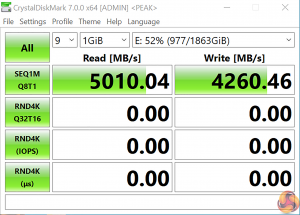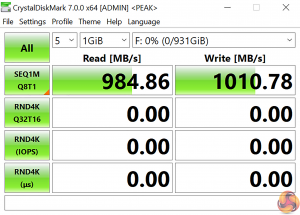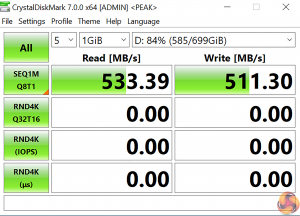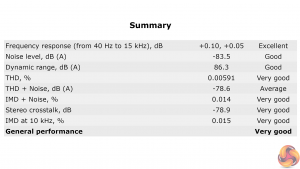M.2 PCIe Performance
We test M.2 PCIe performance using an Aorus PCIe Gen 4 2TB SSD. This SSD uses a Phison-based PCIe Gen 4 controller.
M.2 transfer rate numbers are exactly where we would expect at around 5GBps peak. This is specifically for the CPU-fed Gen 4 M.2 slot, as the secondary chipset-fed connection is limited to PCIe Gen 3 x4.
As the primary M.2 slot does not feature a heatsink, we ran our Gen 4 SSD bare drive to see if thermal throttling would occur. Even with nine back-to-back Crystal Disk Mark test runs, we did not observe thermal throttling, though the drive did run hot.
Of course, most Gen 4 SSDs come with their own heatsink solution and clearly this should be used for a system build.
USB 3.2 Gen 2 10Gbps Performance
We test USB 3.2 Gen 2 10Gbps performance using a PCIe NVMe SSD connected to a Sabrent SSD enclosure.
The B550-fed USB 3.2 Gen 2 10Gbps ports ran at around 1GBps on our USB Type-C test SSD.
SATA 6Gbps Performance
For SATA 6Gbps testing we use a Crucial MX300 750GB SSD.
SATA performance is right where we expect thanks to the B550 connections.
Audio
Rightmark Audio Analyser is a freeware benchmarking utility designed to objectively test the performance characteristics of audio solutions. We setup a line-in line-out loop and execute the record/playback test before generating the results report you see below. A sampling mode of 24-bit, 192 kHz was tested.
‘Very Good’ performance is delivered by the Realtek ALC S1200A audio solution, according to Rightmark Audio Analyzer.
 KitGuru KitGuru.net – Tech News | Hardware News | Hardware Reviews | IOS | Mobile | Gaming | Graphics Cards
KitGuru KitGuru.net – Tech News | Hardware News | Hardware Reviews | IOS | Mobile | Gaming | Graphics Cards







